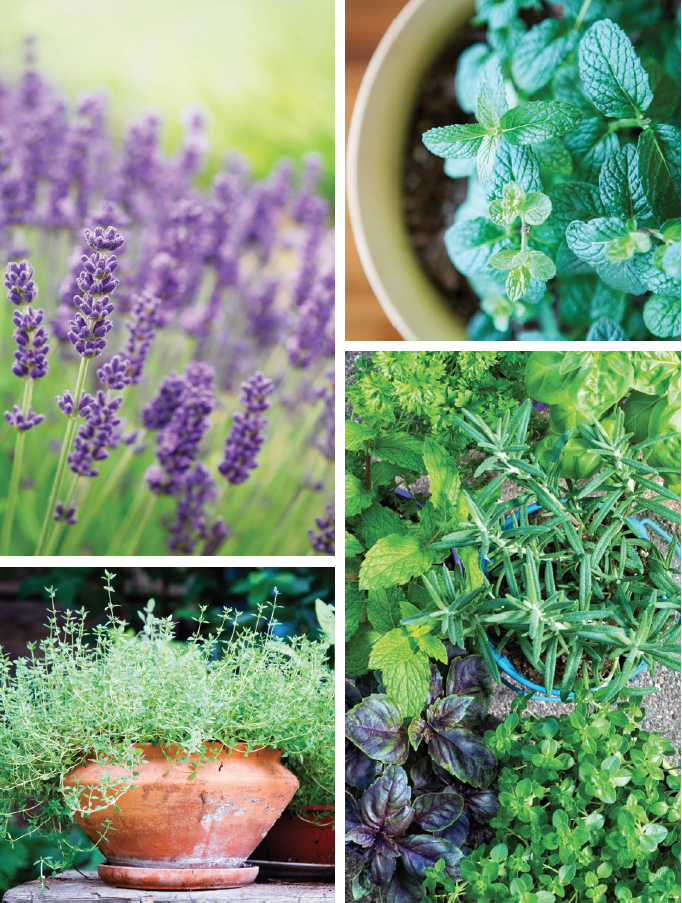
Whether you have a large landscape, an intimate garden or no garden at all, there’s no reason you can’t grow your own herbs. Herbs are easy to plant and maintain, can be tended indoors or out, and offer a wide range of uses and benefits. In addition to the convenience of having all your favorite flavors at your fingertips for cooking and garnishing, many herbs offer natural health remedies, provide fragrances for homes and bodies, and can repel deer and other pests.
Types of Herbs
There are three main categories of herbs: culinary, aromatic and medicinal.
Some of the most popular culinary herbs include basil, rosemary, oregano, chives, sage and dill. When cooking you will use, in general, about 1.5 times the amount of fresh herb as you would the dried variety. Adding herbs at the beginning of the cooking process will promote subtle flavors while adding them at the end provides a more robust punch.
Basil pairs beautifully with fresh mozzarella and heirloom tomatoes. Dill and seafood is a win-win combination. Rosemary, oregano and marjoram are perfect for Mediterranean-inspired dishes, and sage generally sticks around long enough to garnish the Thanksgiving turkey. To harness the freshest flavor, cut herbs just before using them.
It’s easy to understand why some gardeners would plant herbs simply for their aromatic qualities. Lavender-scented candles, lemon balm drawer sachets and custom potpourris made from a variety of fragrant herbs are just a few of the ways they can be used. Lemon verbena, mint, rosemary and thyme are all popular choices.
Of course, scents can be used for the opposite purpose, as well. Lavender, mint and lemon balm are commonly used as bug repellents, so consider planting some in pots near where you sit outside in the summer months. Some strongly scented herbs can also be used to repel the hungry deer population at Smith Mountain Lake. Use anise, chives, dill, horseradish, lavender, lemon balm, rosemary and mint as a border to hide the more deer-delicious varieties of herbs or flowers.
There are many herbs that provide a wide range of health benefits, including immune-boosting, antibacterial, antiviral and anti-fungal effects. One of the most popular herbs used for medicinal purposes is ginger (think ginger ale when you’re sick). It has anti-nausea effects as well as broad-spectrum antibacterial, antiviral, antioxidant and anti-parasitic properties. Peppermint is one of those home remedies used in tea when one is sick—and why not? It benefits the respiratory system. Lavender is used to calm and relax—consider the bath soaks with lavender used for this very purpose.
Growing Tips
Smith Mountain Lake is in USDA’s Zone 7b for plant hardiness, which means temperatures can dip low in the winter months and you’ll need to plant accordingly. Some herbs are perennial and will come back year after year—if the ice and snow don’t get to them first. Chive eagerly reseeds itself. Rosemary, a woody plant, will last the winter through, and sage, lemon balm and mint come back at the first sign of summer.
Herbs are relatively easy to grow as long as they get abundant sunshine, regular watering, a little fertilizer and are planted in soil that drains well. If planting in your landscape, consider spots where herbs have plenty of room to spread out and where they’ll get morning sun and afternoon shade in the hottest months of summer. A good choice for dill, catnip, cilantro, mint, tarragon and thyme is a spot that gets filtered light, such as in the shade of trees like oaks that do not have shallow roots. Trim the lowest branches to provide dappled sunlight.
Another option is to grow herbs in raised beds or containers kept just outside your kitchen on your patio or deck. From season to season, refresh and reinvigorate the soil by turning it with rich compost and loosening the earth to promote drainage. Other container trends for herbs include Mason jars, wall planters and tiered towers or ladders.
You can start your herbs indoors in peat pots in a sunny window, or in a small greenhouse. Transfer them to the garden proper once the threat of frost has passed. Another way to start herbs is to visit some of the well-stocked greenhouses in the area for seedlings, which will produce greenery much faster. In the hotter months, water daily. The best time to water herbs is in the morning, when the evaporation threat is minimal; watering in the evening can cause fungus.
From designing a complicated herb garden to having a few pots handy on your porch, be assured that herbs will increase your olfactory, visual and gustatory pleasures.
